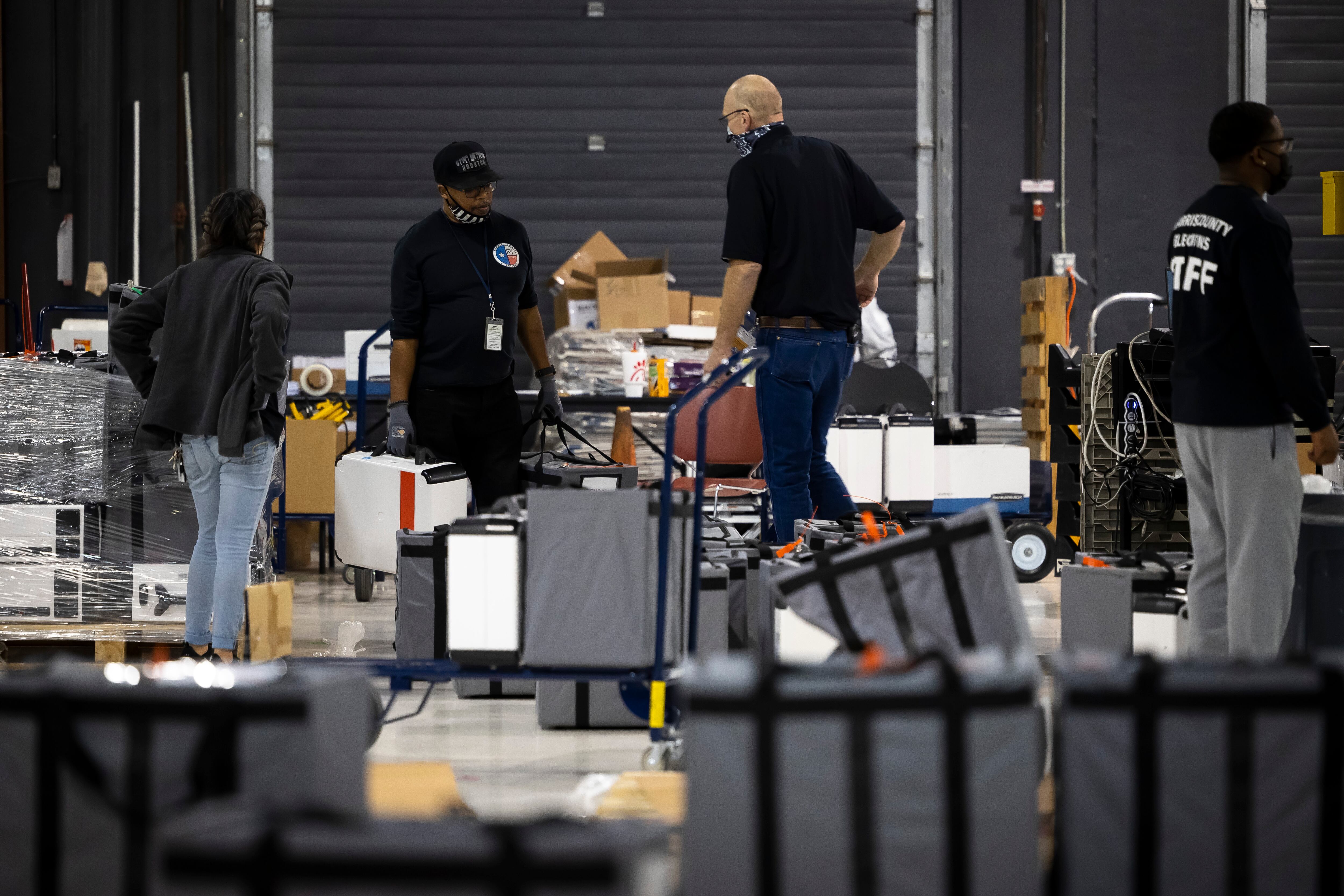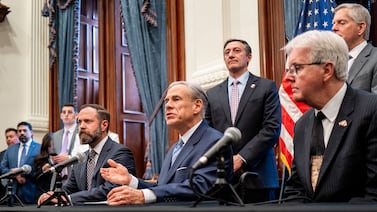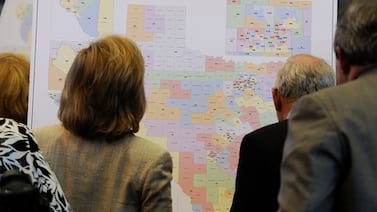Votebeat is a nonprofit news organization reporting on voting access and election administration across the U.S. Sign up for our free newsletters here.
The Texas Attorney General’s Office on Tuesday appealed the decision of a judge to temporarily block a new law passed by Republicans to abolish Harris County’s elections chief position. The decision by a Travis County district judge earlier Tuesday found that the law is unconstitutional and would disrupt this fall’s elections.
The Texas Attorney General’s Office filed its appeal in the Texas Supreme Court, keeping Travis County District Judge Karin Crump’s order from taking effect.
The law, which would have forced the county to eliminate the county’s elections administrator and transfer all election duties to the county clerk and the tax assessor-collector, is set to take effect Sept. 1, weeks before early voting begins for the county’s November municipal elections.
Nonetheless, Harris County officials said the earlier injunction was a “win” for the county and “local officials across the state.”
Harris County Attorney Christian Menefee filed the lawsuit in Travis County District Court last month and argued the law, Senate Bill 1750, violates the Texas Constitution because it was used by the Legislature to single out one county. Menefee asked Crump to prevent the law from taking effect.
Crump agreed and in her ruling added, “Not only will this transfer lead to inefficiencies, disorganization, confusion, office instability, and increased costs to Harris County, but it will also disrupt an election that the Harris County EA [elections administrator] has been planning for months. The Harris County Clerk and the Harris County Tax Assessor-Collector have had no role in preparing for the November Election.”
Those were the same concerns Menefee detailed in his initial filing to seek an injunction.
“Without court intervention, the public’s selection of their elected representatives — the core process on which our democracy rests — will be risked in Harris County,” the filing says.
At a Tuesday news conference celebrating the decision, Menefee called the law an “existential” threat to county sovereignty.
“The Texas Constitution says what it says,” he said. “This filing is much bigger than this particular law.”
Menefee said Harris County’s lawsuit is “reining in misguided legislators” whom he said “aren’t playing in good faith anymore.”
Texas Republicans, who dominate the state Legislature, spent this year’s legislative session pushing for unprecedented state authority over elections in Harris, the state’s most populous county and a Democratic stronghold. The result was a new law introduced by Houston-based state Sen. Paul Bettencourt, a Republican — one that election experts told Votebeat is likely to cause disruptions and problems for voters in the county’s elections this fall and in 2024. The new law would force a rushed department transition and impose responsibility for dozens of state-mandated election-related deadlines on new officials in the middle of the crucial process, observers said.
Bettencourt was unavailable Tuesday for comment on the court’s decision.
In a news release, the Texas Attorney General’s Office said the office maintains that “the legislature had a reasonable basis for the law: Harris County is the most populous county in Texas, and, as such, has an outsized statewide impact on elections, a consideration enhanced by the county’s past significant difficulty with election administration.”
On Tuesday, the Harris County Republican Party filed an intervention to support the implementation of the law. The filing claims Harris County’s current and former elections administrators have “totally botched” past elections there and therefore the new law to return duties to elected officials should be upheld.
Harris was one of the last large counties in Texas to create an elections department and appoint an elections administrator, something other counties began doing in the 1970s. County leaders in 2020 appointed an inexperienced elections administrator, Isabel Longoria, to lead the newly created department, which had also just purchased new equipment voters would have to learn to use. Longoria resigned in July 2022, after the department missed the deadline in the law to report unofficial primary election vote totals to the state. The county then appointed Clifford Tatum, who has years of experience running elections but inherited the department with very little time to fix lingering administrative problems before the November 2022 general election.
In that election, Harris County had to extend voting for an hour after various polling places experienced problems with voting machines, ballot paper shortages, and long waiting times. The county’s elections department lacked a tracking system typically used by large counties to identify issues as they occurred, and for months could not say how many polling locations ran out of paper on Election Day or whether anyone was prevented from voting. The Houston Chronicle subsequently reported that out of the more than 782 polling locations, only about 20 ran out of paper.
Soon after the election, 21 losing Republican candidates filed lawsuits against the county, citing those problems and seeking a redo of the election. The first of those cases was tried in a Houston District Court last week, and a ruling by that judge is pending.
In that case, Erin Lunceford, a former judge and a Republican candidate for 189th District Court who lost her race to Democrat Tamika Craft by a 0.26% margin, around 2,000 votes, is seeking a new election. Her attorney has argued that “irregularities” during the November election, such as the ballot paper shortages and malfunctioning equipment, raise questions about the reliability of the results and warrant a new election. Additionally, Lunceford’s counsel said thousands of people were prevented from voting, but Craft’s defense lawyer pointed out that they failed to bring a single voter to testify that they were, in fact, prevented from voting.
A decision in Lunceford’s case could dictate the fate of the other pending cases. One other losing candidate dropped his lawsuit last week.
Natalia Contreras covers election administration and voting access for Votebeat in partnership with the Texas Tribune. Contact Natalia at ncontreras@votebeat.org.






